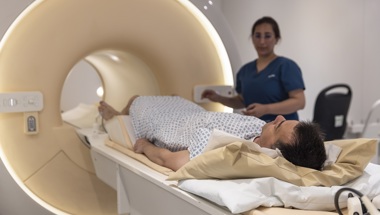Research
28 Nov 2023Simple changes can vastly increase MRI quality, giving men a faster, more accurate diagnosis
The changes could benefit huge numbers of men worldwide, preventing thousands of biopsies and making others more accurate.

While working to speed up MRI scans for prostate cancer, researchers have found simple ways to significantly increase the quality of the scans.
For men with suspected prostate cancer, better quality MRI scans make it easier for doctors to make treatment decisions, and to pinpoint the most suspicious areas to test with a biopsy.
And for men without the disease, it means doctors can be more confident in ruling out the disease without a biopsy, sparing these men an invasive and often painful procedure.
With the tweaks, three times as many MRI scans were good enough quality for doctors to either identify or rule out prostate cancer – making a big difference to men’s diagnoses with very little effort.
Changing the way prostate cancer is diagnosed
The research builds on years of work, funded by us thanks to your support, to transform the way prostate cancer is diagnosed.
Diagnosing the disease used to involve a random biopsy where the chances of missing a significant cancer were high – around 50%.
That was because there weren't any scans that could accurately identify potential cancer in the prostate and guide biopsy needles to the right places.
We funded researchers at University College London (UCL) to test a new imaging technique on the prostate, called multiparametric magnetic resonance imaging (mpMRI), to see if it could make diagnoses more accurate.
The results led to a larger trial that showed mpMRI led to more accurate biopsies, and fewer men having unnecessary biopsies – and today, most men with suspected prostate cancer are given an MRI scan before being considered for a biopsy.

Making MRI scans faster and more accurate
However, even though an MRI scan is quicker and cheaper than a biopsy, there was still room to make it quicker still, to ensure more men could access one.
That’s why we recently funded a trial called PRIME, also at UCL, to see if an even shorter, cheaper and less invasive MRI scan could become the new standard. This research is part of that trial.
In setting up PRIME, the researchers analysed a total of 355 MRI scans from 41 medical centres across 18 countries, and found just 32 per cent were of the best quality. But after giving feedback to the medical centres on simple ways to improve their MRI scans, the team found 97 per cent of scans reached the highest standard.
This is an important step towards making fast, accurate MRIs available to all men who need one. The results will feed directly into PRIME which, if successful, could reduce the time needed to perform an MRI to just 20 minutes on average.
Giving men worldwide a better experience
Dr Hayley Luxton, Senior Research Impact Manager at Prostate Cancer UK, said: “Multiparametric MRI scans have transformed how we diagnose prostate cancer, giving men a more accurate diagnosis and helping avoid unnecessary biopsies.
“But it can also be time consuming and sometimes uncomfortable, as it involves multiple images and requires men to have an injection. That’s why, with The John Black Charitable Foundation, we co-funded the PRIME trial to see if it could be just as effective with fewer images and without the jab.
“What we didn’t anticipate was that it would have such a massive impact on how hospitals around the globe take mpMRI images. This incredible boost in how many are generating the best quality images is all thanks to the knowledge and support shared by world-leading team at UCL and we’re proud that our funding has helped bring this about.
“Not only will this help the researchers, but it means huge numbers of men worldwide will be getting a better and more accurate diagnosis.”
Associate Professor Veeru Kasivisvanathan, a senior author of the study at UCL, said: “The long-term goal of our work on prostate cancer screening is to see whether we can effectively diagnose or rule out cancer using a shorter, cheaper MRI scan.
“There is growing awareness amongst cancer specialists that variable quality of MRI scans poses a challenge to this approach, hence the results of the GLIMPSE study are an important step towards making MRI imaging as quick, cheap and effective as possible.”






